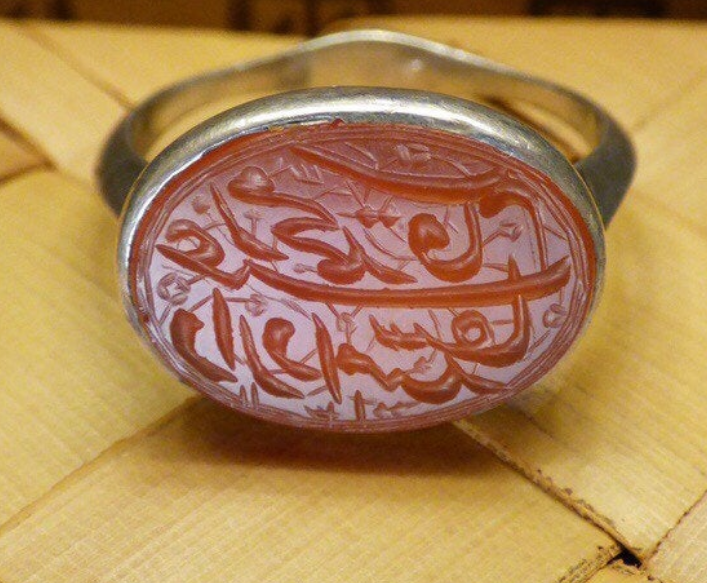FWP:
SETS == SYMMETRY
For background see S. R. Faruqi's choices. This verse is NOT one of his choices; I thought it was remarkable and have added it myself. For more on Ghalib's unpublished verses, see the discussion in {4,8x}.
On seals and signet-rings, see {61,5}.
The 'establishedness'-- not just durability, but also acceptedness, respectedness, venerability, validity, esteem-- of a signet-ring or seal depends on the name of the owner of the 'house' or estate that includes the ring (1b). And, if we also read the line in reverse, as we equally well can and should: the 'name' and honor and prestige of the owner of the 'house' or estate that includes the signet-ring depends on the 'establishedness' (in all the above senses) of the signet-ring or seal itself (1a).
In short, (1b) says the signet-ring won't be esteemed unless its owner is; and (1a) says the owner won't be esteemed unless the signet-ring is. Both these highly abstract pieces of general information are bestowed on us by the first line. Needless to say, they give us not a clue as to where the verse is going.
The second line, as so often, starts afresh in grammar and vocabulary, so that we're left to figure out for ourselves how to put the lines together. Here are two basic ways in which the relationship could be configured:
(1a): The speaker used to lie prostrate and flat in the beloved's street, like a piece of paper stamped with the impression of her seal or signet-ring; or else he used to lie so flatly in the dust that he marked it with his 'stamp, impression' as though he were a seal or signet-ring; this visible 'seal of approval' established her claim to ownership of the whole street (including the speaker).
(1b): Because of her established ownership of the whole street, the speaker was able to constantly remain there like a specially marked token or signet-ring; people recognized him as hers, and recognized her rights of ownership by accepting his presence.
A further layer of complexity comes from the many possible readings of naqsh-e muddaʿā . A naqsh can be not only a stamp or seal-impression (the sense that most strongly connects with the first line), but also a picture or image or shape of many kinds (see the definition above)-- which would leave the sense of 'stamp' as a form of wordplay.
But even more to the point, whose is the muddaʾā , who is it who has 'claimed' or 'alleged' or 'desired' that particular image or appearance? We tend to take it as the beloved, but it could also be the street itself, wishing to establish or confirm its own prestige. Or it could even be the speaker himself, wanting to make sure that everything about the street contributed to the beloved's further glory. For another example of such complex uses, see {4,1}.
For a beautifully apposite verse, compare {140,6}
with its equally abstract first line.

Zamin:
The meaning is that to the extent that the house-dweller would remain fixed-- that is, as long as the house is inhabited-- for so long the owner of the house too has a 'name'. If we were not there, your street would not be inhabited, nor would your 'name' or the 'name' of your street exist.
== Zamin, p. 33